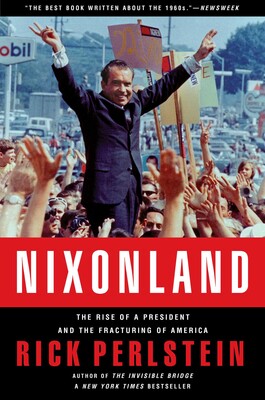Rick Perlstein is an acclaimed historian and author of several books about American politics, from the 1960s to the present. He is currently a special guest columnist for The American Prospect, covering issues around the 2024 election. One of his most-acclaimed books is Nixonland, and after reading a couple of his recent columns, I was inspired to read it.
Sometimes it seems that our country hasn’t been this divided since the civil war. While Nixonland is not exactly a reassuring story, it does point to a more recent period where the country was arguably even more divided than it is now.
First of all, the book is entertaining from beginning to end. It tells an important story, but is packed with dramatic episodes at every turn. For those of us who were children during the contentious 60s, the list of names is familiar, but the characters behind the names are at last fleshed out.

The story focuses on the years between Lyndon Johnson’s presidential landslide election in 1964, and Richard Nixon’s landslide election in 1972, essentially turning the country’s politics around 180 degrees. It takes the time to fill in details of Nixon’s upbringing and apparent motivations, and speculate about the ongoing polarization as of the book’s release in 2008.
About Nixon’s motivations:
“Nixon has been the subject of more psychobiographies than any other politician. His career vindicates one of that maligned genre’s most trustworthy findings: the recipe for a successfully driven politician should include a doting mother to convince the son he can accomplish anything, and an emotionally distant father to convince the son that no accomplishment can ever be enough.”
– Nixonland, p. 22
One of the conflicts that he introduces early on is the Franklins versus the Orthogonians. The social elite students at Whittier College called themselves Franklins. The Orthogonians was a club that Nixon formed as a student there, strivers who were proud to be outside of the Franklin circle. He told the members that Orthogonian (literally, “at right angles”) meant “straight shooter”. The Franklin-Orthogonian dynamic provides a meaningful framing for many of the key conflicts of Nixon’s career. The politics of resentment found its prophet in a man who constantly felt embattled by the elite establishment.
If there is an overall tonic effect achieved by taking the long view, and comparing those violent times to our own, there are also many malevolent “origin story” moments here – for example, as we recognize Roger Ailes, who became Nixon’s executive producer for television during his 1968 campaign, and later went on to found Fox News. At a lower (power) level, we see that Roger Stone, nihilist for the right, was an original Nixon dirty trickster and is still content to serve in Trump’s rank and file.
Perlstein captures the spirit of the times by evoking pop culture touchstones every step of the way. There are song references “Something was happening here. What it was wasn’t exactly clear.”, movie references – Bonnie and Clyde standing in for the nihilistic youth culture, Patton glorifying Nixon’s command and control culture. There’s Jane Fonda and John Wayne, Woodstock and Up With People.
There are numerous “what went wrong” stories embedded here too. Mike Royko, a Chicago newspaper columnist, is a personal favorite of mine. In an incident where Chicago police killed two Black Panthers in their apartment, the Panthers invited people in to investigate the scene of what police called “the gun battle”. Royko took them up on it and, brought in a ballistics expert, and reported that somehow all of the 76 bullets fired on the scene were directed inward, towards the apartment. Later in the book, when the “reform” forces successfully challenged Chicago Mayor Daley’s slate of delegates to the 1972 Democratic convention, Royko challenged the reform delegate slate: “I just don’t see where your delegation is representative of Chicago’s Democrats. As I looked over the names of your delegates, I saw something peculiar…. There’s only one Italian there. Are you saying that only one out of every 59 Democratic votes cast in a Chicago election is cast by an Italian? And only three of your 59 have Polish names…. Your reforms have disenfranchised Chicago’s white ethnic Democrats, which is a strange reform.” In this scenario, George McGovern and even Jesse Jackson favored some sort of compromise in seating the Chicago delegates, but the reform firebrands let McGovern know that they would not support him if he compromised.
Thanks, undoubtedly, to Nixon’s penchant for recording his conversations for posterity, we know that his private conversations were as contemptible as Trump’s public ones. For example, the darkly comic conversations with Henry Kissinger, where Nixon just did something reprehensible, and Kissinger cheerleads his guilt away, as in this discussion of Nixon’s pardon of Lt. William Calley, scapegoat for the My Lai massacre:
“The doves are really, really, you’re right, deeply worried about Calley. They’re worried because – they realize that what it is, is an animal instinct in this country coming up, and most of the people don’t give a shit whether he killed them or not!”
“Zhat’s right” – Kissinger’s amen; then the president: “I don’t – I don’t – I don’t impugn military justice at all! I uphold it!”
Nixonland, p. 559
Should we be glad that it is so much more out in the open now, or mourn that the veneer of civilization has been stripped away?
In looking up sources for this most untimely review of a book published in 2008, I found a review of the book in the New York Times, written by, of all people, George Will. While Will does admire Perlstein’s writing, he chides him again and again for suggesting that this country was still split into warring factions. Will is currently an exile from the Trump Republican party, and even he might agree, that didn’t age well.


